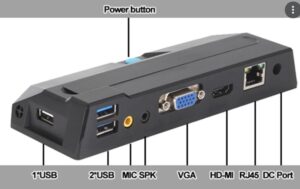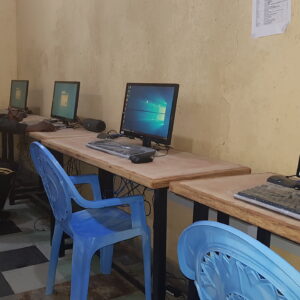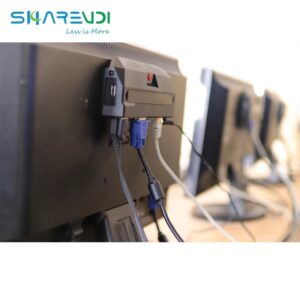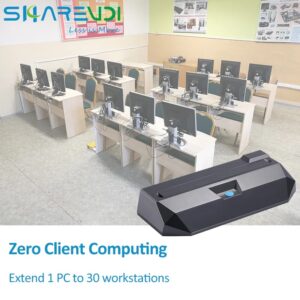A thin client is a type of computer or device that relies heavily on a central server or cloud-based infrastructure for its computing resources. It is designed to be lightweight and dependent on a network connection to access applications, data, and processing power.
Unlike traditional computers that have their own operating systems, software applications, and local storage, thin clients typically have minimal hardware specifications and rely on a server or cloud environment to perform most computing tasks. The server or cloud infrastructure handles the processing and storage requirements, while the thin client device acts as a terminal to display the user interface and transmit user input to the server.
Why chose thin Client solution?
1. Cost Savings
It is important to emphasize inexpensiveness as a notable advantage of thin clients. Remember that hardware resource optimization, reduced maintenance, and better security translate to cost effectiveness and efficiency, particularly when compared to the using individual system units. This inexpensiveness is the reason why client-server architectures based on thin clients are commonly used in education and business environments where financial resources are of critical importance.
Thin Clients Reduce Multiple Costs:
- IT support costs
- Upfront purchasing costs
- Capital costs
- Use of space in data center
- Licensing costs
- Total administration and operating cost reduction up to 70%
- Reduces Energy Bill by 97%
- Thin clients consume an average of 5-10 watts compared to a 220 watt PC
- This reduces carbon footprint
- Cost savings from electricity can be reinvested
2. Require less power (So they are not affected by low voltage) .
Thin clients have a smaller carbon footprint than PCs because they have fewer moving parts. Hard drives are notoriously complex mechanical devices. With smaller processors and less memory, thin clients also generate less waste heat. Thin clients are powered by 5V power adapters as compared individual system units powered by 240v power source Visit our partners,shoes – leaders in fashionable footwear!
3. Simplified Management
The Benefits of Thin Client Management are:
- All software and hardware upgrades, security policies, application changes, etc. can be made in the data center
- IT personnel are not required (as they are with PCs) to fix individual problems at the end user desktop location
- Less downtime, increasing productivity amongst End Users and IT personnel
- Centralized and simplified back up of desktops, laptops, and other client access devices
4. Enhanced Security
The Benefits of Thin Client Security Include:
- Thin clients are protected from the use of unauthorized software or the introduction of viruses
- Data cannot be copied to a disk or saved to any other location than the server
- Centralized processing makes it easy to manage and monitor the system
- Simplify security, protect intellectual property, ensure data privacy
5. Increased Productivity
- Systems can be Virtually Preconfigured, Packaged and Put into Operation in Minutes
- Quickens setup and enables flexibility, without needing a specialist staff
- Productivity can increase, while standard PCs have long repair times that cause delays and higher costs
- Access the same apps and data from virtually anywhere
STRUCTURAL DISPLAY OF THIN CLIENT SYSTEM

OUR CURRENT CLIENTS OF THE THIN CLIENT SYSTEM
- Biaka University Institute of Buea –(BUIB ) with 20 thin client and one server
- Buea Institute of Technology – (BIT) with 16 computers and one server
- Ma Mafotsa Nursery & Primary School Douala with 16 thin clients units and one Server
- Government High School – (GHS) Buea Town with 20 computers and one server























 [contact-form-7 id="2791" title="Footer Contact form"]
[contact-form-7 id="2791" title="Footer Contact form"]